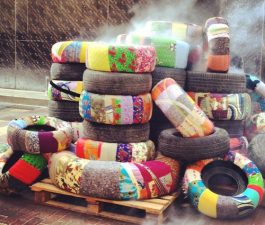It’s not just excess calories anymore. It could be that environmental chemicals are ordering your body to put on the pounds.
We live surrounded by synthetic chemical substances. They’re in our food, our soaps, in hundreds of thousands of things we handle daily. Like parabens, a preservative found in moisturizers and bath products. Exposure to toxic chemicals is associated with a long and dismal list of ailments. An article in onearth magazine now shows us that toxic chemicals have a real link to obesity too.
“What has, up to now, been overlooked is that the earth’s environment has changed significantly during the last few decades because of the exponential production and usage of synthetic organic and inorganic chemicals. Many of these chemicals are better known for causing weight loss at high levels of exposure but much lower concentrations of these same chemicals have powerful weight-promoting actions.” So writes Dr. Paula Baillie-Hamilton, authority on metabolism and environmental toxins, at Stirling University, Scotland.
Baillie-Hamilton calls toxic chemicals endocrine disruptors, meaning that they cause the body to halt natural hormonal processes or to over-produce hormones. Early puberty and adult-sized breasts in children are typical symptoms of hormonal disruption. These endocrine disruptors have another new name: chemical calories.
How does exposure to environmental chemicals change our hormones and make us fat?
Bruce Blumberg, professor of developmental and cell biology at the University of California researches the effect of chemicals tributyltin and triphenyltin on mice. These chemicals are painted on boats and cooling towers in order to kill molluscs and fungus and to preserve wood. Humans absorb the chemicals by eating fish living in water polluted by them. Prof. Blumberg’s studies on pregnant mice fed with doses equivalent to human exposure show that the baby mice are born with more fat cells, and bigger ones, than average. Hungrier, fatter mice. Logically, human fetuses exposed to tributyltin and triphenyltin will be babies with more, and bigger fat cells too – hungrier, fatter people.
And those are only two of thousands of toxic chemicals we’re exposed to every day. Other research has discovered strong links between endocrine disruptors and obesity.
Jeanett Tang-Peronard, of the Institute of Preventive Medicine in Copenhagen, writes that absorption of chemicals in the uterus and in childhood disrupts hormones that regulate fat storage and appetite. But the effects of chemicals seems to extend beyond the tender years, if research conducted by the University of Alabama is to be believed. According to the University, animals living around humans become fatter, even if their food and exercise are strictly monitored. This argues that chemicals in the human environment are present and strong, affecting all living organisms exposed to them.
Well, shall we all just go jump down the nearest volcano crater in despair?
Not if we want to effect changes. First, follow the advice of Dr. Maida Galvez of Mt. Sinai Hospital, who monitors 330 East Harlem children’s exposure to endocrine disruptors vis a vis their body weight. Examine all plastic water and baby bottles and plastic food containers – if it has the number 7 printed on the bottom, recycle it. Use fragrance-free hygiene products and read their labels. If the ingredient phthalate (a petroleum derivative) is on the label, look for an organic equivalent.
As an old-time soapmaker myself, I know that many handcrafted soaps and shampoos are natural and biodegradable, although not necessarily 100% organic. Look for artisanal soapmakers near you and ask what ingredients they put into their products.
And of course, eat fresh, seasonal produce, not those sad fruit and veg languishing under plastic wrap. Avoid processed meat because it’ll surely have meat glue in it.
Then, find an anti-pollution cause that grabs you, and go agitate for it.
More hormone disruption awareness from Green Prophet:
- Estrogen Exposure Raises Blood Pressure
- Reducing Micro-Pollutants in Israel
- Chemicals and Your Baby’s Skin
- Bisphenol A Disrupts Human Eggs in IVF Treatment
- Lipstick and Hairspray Arthritis Triggers
Photo of soap bubbles by the Italian Voice via Flickr.




